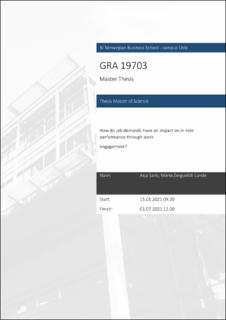| dc.description.abstract | The purpose of this research is to examine how job demands (loneliness,
technological problems, and job insecurity) have an impact on in-role
performance through work engagement (vigor, dedication, and absorption) in the
virtual context as a consequence of the global pandemic. The study has two
hypotheses in which it first investigates the relationship between job demands and
work engagement, and hence investigates the relationship between work
engagement and in-role performance. The theoretical framework is based on the
theory of Work Engagement by Schaufeli (2002) and the Job Demand-Resource
Model by Bakker & Demerouti (2011). Our research design is based on a
qualitative methodology with quantitative support. The qualitative method is used
to explain how job demands have an impact on employees' work engagement
through an in-depth analysis where data is derived from semi-structured
interviews. The qualitative method is used to reveal indications of the relationship
between the variables (job demands, work engagement, in-role performance)
through statistical analysis, which in turn confirms or rejects the hypotheses. The
sample of our research is customer consultants at a Norwegian call center who
have been highly affected by the global pandemic of Covid-19, and who have
been working from home during the past year. Findings from the research reveal
tendencies that both loneliness, technological problems, and job insecurity have
an impact on employees' work engagement. However, loneliness seems to affect
engagement to the greatest extent as it shows to have an impact on both vigor,
dedication and absorption, followed by job insecurity and then technological
problems. Further, the findings have empirical support in which employees who
experience less work engagement as a consequence of job demands perform at
lower levels. Similarly, employees who do not experience job demands to the
same extent seem to be more engaged and hence have higher in-role performance.
The findings add to the literature of positive organizational psychology and are
useful for both employees as well as for organizations.
Keywords: job demands, work engagement, in-role performance, loneliness,
technological problems, job insecurity, virtual context | en_US |
